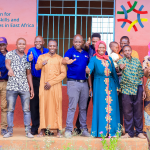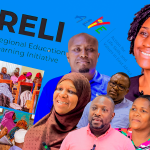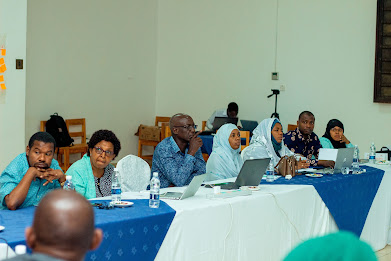13-17-year-olds, the Assessment of Life Skills and Value (ALiVE) Project is
entering into another phase (Phase two) which targets 6-12 olds, in schools. In
an effort to impart positive mindset through nurturing of values and life
skills, especially 21st century skills, the project will work with
education systems to formulate best ways to have formative assessments of
values and life skills.
This is a major step to be made through the Life Skills and
Values Project explained in the launch of the ALiVE Phase two Project, the
launch took place in Zanzibar on 15th June 2023.
ALiVE Phase 2 was launched on 15th June 2023, at the
Golden Tulip Hotel, Malindi, Zanzibar. It was officiated by the Minister of
Education and Vocational Training – Hon. Lela Muhammed Mussa. Speaking to
journalists after launch, Hon. Lela said, “This project has started with the first
phase and has made great achievements. Evidence on the challenges that we have
for our children were illuminated through the assessment findings on levels of
proficiencies of assessed adolescents in life skills and values. Most of the
youth finish school while they still lack mastery of essential life skills that
are pertinent in the labor market. Regardless, of whether they seek employment
or self-employ, they need these skills to be able to thrive in this 21st
century world. Therefore, we must help these children shape the education
system to assist our children to master 21st century skills.”
The Global Facilitator of ALiVE Project, Educationist and
Life Skills Expert, Professor Esther Care, in an interview with
the Tanzanian Kids Times, commended the governments of Kenya, Uganda and
Tanzania for incorporating life skills into their Education Curricula. She said
that, this shows good progress in helping the child. Prof. Care said, “All
three countries Kenya, Tanzania and Uganda they have seen that the Education
system before, was not adequately preparing children for future opportunities
and that children needed more than just literacy skills, but also building of
problem-solving skills, Insights into what is happening and what happens to
others and the skills of collaboration. And if so, we need to incorporate these
skills into the curriculum, because if we measure these things in children, we
will find a way to prepare appropriate curriculums”.
Samson John Sitta from the Milele Zanzibar
Foundation is the ALiVE Project Coordinator in Tanzania, he mentioned three
areas that ALiVE Phase Two Project will focus on over the three-years period.
“In this second phase, the project focuses in three outcome
areas; SYSTEMS SHIFT, ASSESSMENTS SHIFT; and LEARNING HUB. We will be working
with Government departments as we go this way because this project is now going
to be implemented for children aged six to twelve years, who are in school,
unlike the first phase where we focused on household assessments,” said
Samson John Sitta.
The launch of ALiVE Project Phase 2 was
accompanied with capacity-building training to East African Education
stakeholders and representative members of the Regional Education
Learning Initiative (RELI).
PHOTO OF RICHARD MABALA:
Mwl. Richard S. Mabala, the Expert of Life Skills
and ALIVE Project Technical Team member had this to say, “We’ve looked more deeply at what
life skills are and what 21st century skills are. It is basically
the same but its direction is a little different, we have started to figure out
how to evaluate so that we can test our children whether they are getting these
skills or not, because if you look at the draft of the new Education Policy, 21st
Century Skills are strongly emphasized, so ALiVE’s mission is to contribute to
the implementation of the new Education Policy”.
The Director of Zizi Afrique Foundation, a non-governmental
organization from Nairobi which hubs ALiVE regionally, Dr. John Mugo, said: “We
in Kenya have been able to make progress as well as here in Tanzania and we are
now working closely with the Kenya Institute of Curriculum Development (KICD) and this
partnership will focus on the teachers, how they will be empowered by the national
curriculum and testing, so that we can make progress and every child can gain
these life skills and values.”
Mr. Shaaban Khatibu Shaaban, an official from the Zanzibar
Examinations Council (ZEC), was part of the workshop trainees. During interview
with Kids Times, he said, “ALiVE project phase one, found many young
people with low levels of proficiencies in self-awareness, problem solving,
communication and collaborating. Through this second phase, we believe these 21st
century skills will be integrated and teachers will be facilitated to
understand, hence teach life skills and values.”







